北师大M2U4L3 Virtual reality
- 格式:ppt
- 大小:4.73 MB
- 文档页数:60
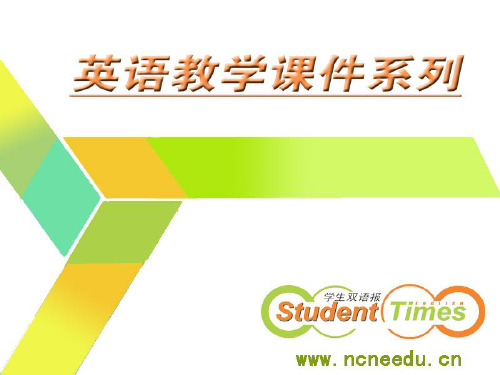

Unit 4 Lesson 3 Virtual Reality导学案1【learning aims】1. Understand the words related to virtual reality.2. Find out the key information related to virtual reality.3. Use some useful expressions to express one’s opinion.【自主学习•课前准备】1Read the passage and answer the following questions:1) Why can’t Cathy go out this weekend?2) What is Tom planning to do?3) If virtual reality holidays were invented, what would Cathy do?4) What would Tom like to do with virtual reality?5) Why Cathy so excited about the technology?3. Find out the following phrases according to the Chinese meaning.1) 这个周末你要干什么?___________________________________2)完成有关因特网历史的项目_______________________________3)取决于天气____________4)去野营_________________5)在…方面有问题/困难__________________________6)并且,而且_____________7)本人亲自______________8)几秒之内周游全世界________________________________9)参观历史遗迹______________________10)收拾行李__________11)发现某事很难想象___________________12) 去周游世界________________________【合作探究•能力提升】1. Read the passage and find out the Tom’s and Cathy’s opinions about virtual reality:2. Read the passage agai n and find out some useful expressions for expressing one’s opinions:3. Work in pairs:Make a dialogue about advantages and disadvantages of a virtual university with your partner. The useful expressions above can be helpful.Homework:Write a passage about advantages and disadvantages of a virtual university.3). A best man ____________ help to plan a bachelor (单身汉) party, the best man ___________ pay for the party alone. He __________ split the cost(分担费用) with the other attenders.4) A bridesmaid _________ be social. She ___________ talk to as many guests as she can.5) A best man ___________________ badmouth the bridegroom behind his back.6) A bridesmaid _________ just stand around and look pretty.【拓展练习•巩固提高】1. Culture corner :complete the description of traditional weddings in SouthernChina with the modalsA week before the wedding, the groom’s family (1)__________ go to the bride’s house. They take presents in red boxes. Only the men (2)______ carry them – female members of the family(3)_____ carry the presents. One strange thing is that the bride’s family send them back if they don’t like them –they (4)___________ accept the presents. A few days later, females of the bride’s family (5)_________ take p resents to the groom's family. On the morning of the wedding ceremony, the bride and groom (6)_________ serve tea to their parents. The ceremony is only for the family –friends (7)______ go to it. The reception is where friends can celebrate with the happy couple.2.高考链接1) (10安徽32) Jack described his father, who _______ a brave boy many years ago, as a strong–willed man.A. would beB. would have beenC. must beD. must have been2) (10湖南23) You ____ buy a gift, but you can if you want to.A. mustB. mustn’tC. have toD. don't have to3). (10江西23) I have told you the truth. ______ I keep repeating it?A. MustB. CanC. MayD. Will4). (10山东25) I_______ have watched that movie —it’ll give me horrible dreams.A. shouldn’tB. needn’tC. couldn’tD. mustn’t3.Write 8 sentenceshave to, don’t have to, can, can’t, ought to, ought not to。

Unit 4 Cyberspace Lesson 3 Virtual RealityⅠ. Preparations before class (课前准备)Task 1. Have a try (牛刀小试) 请完成同步作业Page 11 Exercise I---词汇填空Task 2: Have a competition (赛一赛) What is virtual reality?The use of computers with sounds and pictures that make you feel as if you are in a real situation.Task 3: Cultural background (文化背景)什么是虚拟现实技术呢?简单地说, 就是人们利用计算机生成一个逼真的三维虚拟环境, 通过自然技能使用传感设备与之相互作用的新技术。
它与传统的模拟技术完全不同, 是将模拟环境、视景系统和仿真系统合三为一, 并利用头盔显示器、图形眼镜、数据服、立体声耳机、数据手套及脚踏板等传感装置, 把操作者与计算机生成的三维虚拟环境连结在一起。
操作者通过传感器装置与虚拟环境交互作用, 可获得视觉、听觉、触觉等多种感知, 并按照自己的意愿去改变“不随心”的虚拟环境。
比如, 计算机虚拟的环境是一座楼房, 内有各种设备、物品,操作者会如同身临其境一样, 可以通过各种传感装置在屋内行走查看、开门关门、搬动物品; 对房屋设计上的不满意之处, 还可随意改动。
Ⅱ. Activities in Class (课堂活动)Task 1.Rewarding time (比一比)Task 2.Understand the text (课文理解)1. What’s the main idea of the text?A. The weekend life of Cathy and Tom.B. The life that students hope for living in the futureC. The imagination of virtual reality’s holiday and study situationD. Imagination of how to live in the future2. Which of the following is true?A. In the virtual reality holiday, we wouldn’t experience something directly.B. Tome will go camping with his families this weekend.C. Tom will send the website address to Cathy when he gets to school.D. It’s not hard for us to imagine the virtual reality studying situation.3. From the text, we can infer that________ .A. Cathy has lots of work to do this weekend.B. In the future, we will not have to go to our destinations in the flesh at all.C. We will not only be able to travel around the world, but go to study in world famous universities we wanted to.D. Cathy dislikes to spend a long time traveling on planes during holiday.4. According to the text, which of the following is not right?A. It’s a doubt that whether Tom will go camping this weekend.B. It’s likely that we will go anywhere we like using modern technology in virtual reality.C. Tom will help Cathy with her project in any case.D. We needn’t pack a suitcase during virtual reality holidays.5. Where can we find the text?A. technical reportB. science and imagination fictionC. amusement bookD. student’s diaryC AD C BTask 3.Read and judge (读一读、断一断) True or False1. This weekend Tom will help Cathy finish a project on the history of the Internet.2. Cathy is more interested in virtual holiday than Tom.3. Tom will have a virtual reality holidays this weekend.4. Virtual university is an interesting game on line instead of a real university.5. Virtual reality holidays spend less time than real holidays.6. You needn’t go to the real place in virtual reality holidays but you can get real feeling of traveling there.7. The Science Museum on line doesn’t exist in fact, just imagine it.F T F F T T FTask 4.Imagine, recite and practice in class (想一想、背一背、练一练)1. 这个周末你准备做什么_______________________________________________. (Page 12)①. 你看上去很担心的样子, 怎么了?You look worried, what have you been up to?②. 弟弟整个上午把自己关在房间, 他在干什么?My brother locked himself in his room for a whole morning. What is he up to?2.那要看天气情况而定。
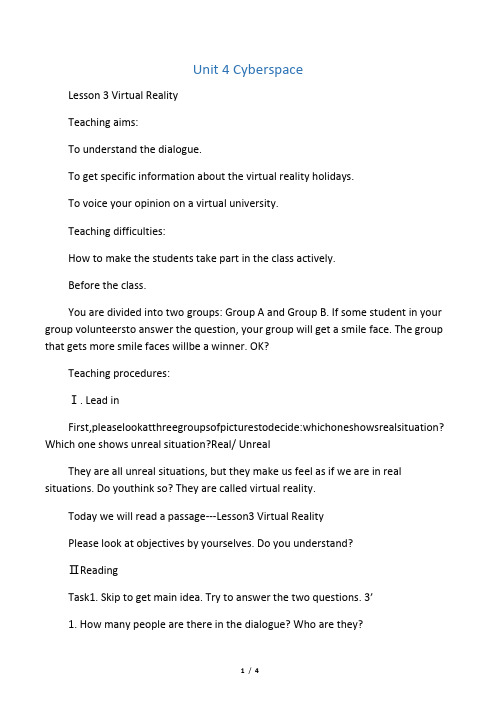
Unit 4 CyberspaceLesson 3 Virtual RealityTeaching aims:To understand the dialogue.To get specific information about the virtual reality holidays.To voice your opinion on a virtual university.Teaching difficulties:How to make the students take part in the class actively.Before the class.You are divided into two groups: Group A and Group B. If some student in your group volunteersto answer the question, your group will get a smile face. The group that gets more smile faces willbe a winner. OK?Teaching procedures:Ⅰ. Lead inFirst,pleaselookatthreegroupsofpicturestodecide:whichoneshowsrealsituation? Which one shows unreal situation?Real/ UnrealThey are all unreal situations, but they make us feel as if we are in real situations. Do youthink so? They are called virtual reality.Today we will read a passage---Lesson3 Virtual RealityPlease look at objectives by yourselves. Do you understand?ⅡReadingTask1. Skip to get main idea. Try to answer the two questions. 3’1. How many people are there in the dialogue? Who are they?Two. Cathy and Tom.2. What virtual reality situations are mentioned in the dialogue?A. virtual computer gamesB. virtual science museum;C. virtual reality holiday;D. virtual universityCheck answers by answering together.Task2. Scan to get detail information. To get some detail information. Please scan the dialogue todecide the following sentences are true or false. 5’While skipping:1) Pay attention to the key words and the major information.2) There is no need to read the whole passage.1.Cathy can’t go out this weekend because she doesn’t finish her project on the history ofthe computer.2.Tom is planning to go camping with his parents.3.The science Museum on line is unreal in fact, just imagine it.4.InCathy’sopinion,shethinksthatvirtualrealityholidaysmustbeconvenientandinte resting.5.Tom prefers virtual reality holidays to virtual universities.Answers: 1. F2.T3. F4. T5.FAsk volunteers to give their answer to find whether the students have some problems.Ⅲ. Careful readingTo get more information, please read the dialogue loud and carefully.Check you by filling in the blanks.If we had virtual reality holidays,We wouldn’t have any problems with1)____________. Wewouldn’t have to spend a long time 2) __________. We’ll be able to use modern technology to go3) ________ we like. We won’t have to go there 4) ________________. We will enter andexitcountries5)_____________andvisitallthe6)_________________.W ewouldn’thave to7)________ a suitcase.Wecouldn’t8)_______________intheseaor9)______________wesaw.Wecouldn’t10)____________it.Suggested answers: 1.the weather2.travelling3.anywhere4.in the flesh5. in seconds6.historical sites7.pack8.dip our toes9. eat the foods 10. experienceAsk two students to write their answers on the blackboard.Check answers with your deskmate.Ask volunteers to give their answer to find whether the students have some problems.ⅣVoice your opinionIn the dialogue, Cathy and Tom also talked about virtual universities, and Tom is moreinterestedinvirtualuniversities.Areyouinterestedinuniversities?Let’senjoysomepicture sofworld-famous universities: Read the following sentences to know more about virtual universities.If we had virtual universities,We’ll be able to study with computers and the Internet anywhere, anytime.We wouldn’t spend much money onteaching buildings.We will save transportation time.We wouldn’t have topay tuition.We will have more comfortable learning environment.However, we couldn’t haveface-to-face communication;we couldn’ttake part in colorful after-class activities.“Would you like to go to a virtual university? Why?”Give the students five chances to speak freely.ⅤSummary & HomeworkToday we read a dialogue between_________ and _________about___________.Fromthedialogue,weknowvirtualrealityholidayshave______________aswellas__ ____________,andsodoes_________________________.Everyonehashis/herown___ __________ on a virtual university.Toconsolidatewhatwehavelearnttoday,pleasewriteashortpassageaboutourdiscus sion:“Would you like to go to a virtual university? Why?”。
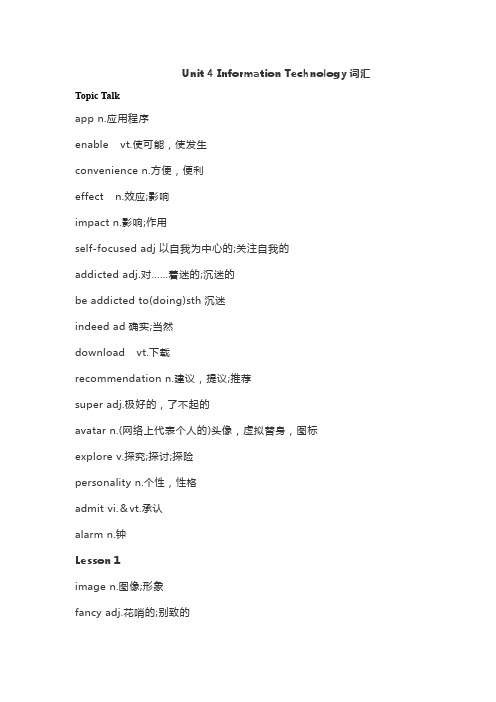
Unit 4 Information Technology词汇Topic Talkapp n.应用程序enable vt.使可能,使发生convenience n.方便,便利effect n.效应;影响impact n.影响;作用self-focused adj以自我为中心的;关注自我的addicted adj.对……着迷的;沉迷的be addicted to(doing)sth沉迷indeed ad确实;当然download vt.下载recommendation n.建议,提议;推荐super adj.极好的,了不起的avatar n.(网络上代表个人的)头像,虚拟替身,图标explore v.探究;探讨;探险personality n.个性,性格admit vi.&vt.承认alarm n.钟Lesson 1image n.图像;形象fancy adj.花哨的;别致的trick vt.欺骗,诱骗,哄骗identity n.身份;特征2d(2- dimensional)adj.二维的variety n.多样化,变化a variety of各种各样的instant adj.即时的;立刻的,马上的instant messenger即时通讯sex n.性别sensible adj朴素实用的;明智的,合理的creativity n.创造力;独创性blog n.博客;网络日志;.发表博客obviously adj显而易见地,明显地experiment vi.&vt.做实验,进行试验;n实验nowadays ad现今,现时hairstyle /n.发型,发式selection n.供选择的同类物品;选择type vi.&.打;打字n.类型,种类concern n.担忧,忧虑;.与…有关;使担心virtual adj.虚拟的;模拟的Lesson 2accommodation n.住处subscribe vi.订阅,订购powerful a效能高的;强有力的;强壮的latest adj.最新的;最近的reality n.现实;真实vr(virtual reality)虚拟现实ar(augmented reality)增强现实mr(mixed reality)混合现实account n.账户software n.计算机软件device n.设置,装置mobile device移动设备ensure v.确保,保证material n.材料;素材gender n.性别press vt.按button n.按钮goods n.商品favour n.恩惠;善意的行为confirm vt.确认;证实deliver vi.&vt递送;传送error n.错误;失误Lesson 3harm vt.&n.伤害,损害argument n.论点;论据replace vt.取代;接替hug n.&vt.拥抱;紧抱concentrate vi.专注,专心;集中注意力concerned adj关切的,关心的be concerned with关心rewarding adj.有益的;有意义的addition n.增添;添加in addition除此之外content n.内容shallow adj.肤浅的;浅薄的trivial adj.没什么价值的;微不足道的basis n.基础;基点percent n百分比;百分数opinion n意见;看法;主张focus vi.给予某物关注;n焦点focus on关注maintain vt.保持;维持smartphone n.智能手机tablet n.平板电脑;药片;碑,牌limiting adj.局限的,限制性的brief adj.简洁的,简明的emoji n.表情符号creative adi.创造性的*thought-provoking.adj.发人深省的,令人深思的authority n.权威人士;专家Writing workshopprofile n.人物简介;传略location n.位置;地点optional adj.可选择的;非强制的imaginary adj.想象的,虚构的fantasy n.幻想作品series n.系列author n.作者,作家amazing adj.了不起的;惊人的privacy n.隐私policy n.政策,方针Reading club 1digitise vt.把…转变成数字形式,使……数字化sailor n.水手,海员accessible adj易懂的;易得到的Reading club 2wristband n.腕带。

Topic: Unit 4 Lesson 3 Virtual realityPresenters:Mr ZhangDate: 2017-11-25I.The analysis of the text:The text is a dialogue between two students, Tom and Cathy, talkingabout virtual reality. Because they are future of the world and thusthey surely will show a greater interest in the topic, I have an intention to give my students a chance to present the class on their own.II. Main objectives:Quality-oriented goals:To inspire students’ independence and imagination;To motivate students’ caring for the future of the world;To cultivate students’ ability of organization and the sense of cooperation.Ability goals:Reading: To enable students’ to catch key information as soon as possible.Speaking: To enable students’ to talk about virtual reality by discussing, interviewing or debating.III. Language focus:Key words and expressions:Be up to depend on go camping offer imagine have anything planned In the fleshGrammar:First conditional and second conditional:(Unlikely and possiblesituations in the future)1. If I don’t finish …, the science teacher will be….2. If we had virtual reality holidays, we wouldn’t have….IV. Teaching aids:PC, newspaper and reading material.V. Teaching approach and method:Constructivism; group work.VI. Teaching procedure:Step I. Lead- in:Welcome to the future world1. Read the passage “Talk like an alien” from newspaper 21st Century and answer some questions such as: What’s the most important factor if we try to communicate with an alien?/How to understand what the aliens are actually saying?/What can you learn from the passage?Task one: group discussionPurpose: To create a different world leading to the future;To arouse Ss’ interest in what they are going to learn;To train Ss’ reading skill.Step II. Text reading:1.Pre-reading:(T: I have a dream. One day we’ll talk with another kind of being from some planet. So what should we do now to make the dream come true?)---Movie show.---The meaning of “virtual reality”.---How to create a virtual reality? In which case is it possible for virtual reality?2.While-reading:---Scanning the text for some questions.---Practice the dialogue in pairs and then present in public.---Discussion:The advantages and disadvantages of a virtual university.(for and against)guage focus: Second conditional--------It is used to express something unlikely in the past, at present and in the future.4.Post-reading:---Writing: My ideal futureRequirement: Use second conditional---Reading: Passage 2 (Week ten Thursday)。
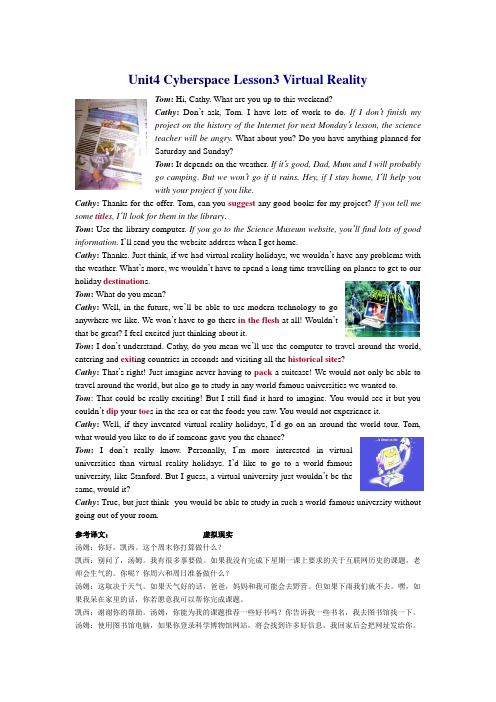
Unit4 Cyberspace Lesson3 Virtual RealityTom: Hi, Cathy. What are you up to this weekend?Cathy:Don’t ask, Tom. I have lots of work to do. If I don’t finish myproject on the history of the Internet for next Monday’s lesson, the scienceteacher will be angry. What about you? Do you have anything planned forSaturday and Sunday?Tom: It depends on the weather. If it’s good, Dad, Mum and I will probablygo camping. But we won’t go if it rains. Hey, if I stay home, I’ll help youwith your project if you like.Cathy: Thanks for the offer. Tom, can you suggest any good books for my project? If you tell me some title s, I’ll look for them in the library.Tom: Use the library computer. If you go to the Science Museum website, you’ll find lots of good information. I’ll send you the website address when I get home.Cathy: Thanks. Just think, if we had virtual reality holidays, we wouldn’t have any problems with the weather. What’s more, we wouldn’t have to spend a long time travelling on planes to get to our holiday destination s.Tom: What do you mean?Cathy: Well, in the future, we’ll be able to use modern technology to goanywhere we like. We won’t have to go there in the flesh at all! Wouldn’tthat be great? I feel excited just thinking about it.Tom: I don’t understand. Cathy, do you mean we’ll use the computer to travel around the world, entering and exit ing countries in seconds and visiting all the historical site s?Cathy: That’s right! Just imagine never having to pack a suitcase! We would not only be able to travel around the world, but also go to study in any world famous universities we wanted to. Tom: That could be really exciting! But I still find it hard to imagine. You would see it but you couldn’t dip your toe s in the sea or eat the foods you saw. You would not experience it.Cathy: Well, if they invented virtual reality holidays, I’d go on an around-the-world tour. Tom, what would you like to do if someone gave you the chance?Tom: I don’t really know. Personally, I’m more interested in virtualuniversities than virtual reality holidays. I’d like to go to a world-famousuniversity, like Stanford. But I guess, a virtual university just wouldn’t be thesame, would it?Cathy: True, but just think--you would be able to study in such a world-famous university without going out of your room.参考译文:虚拟现实汤姆:你好,凯西。
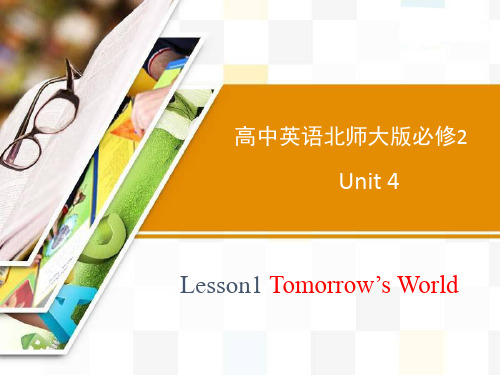

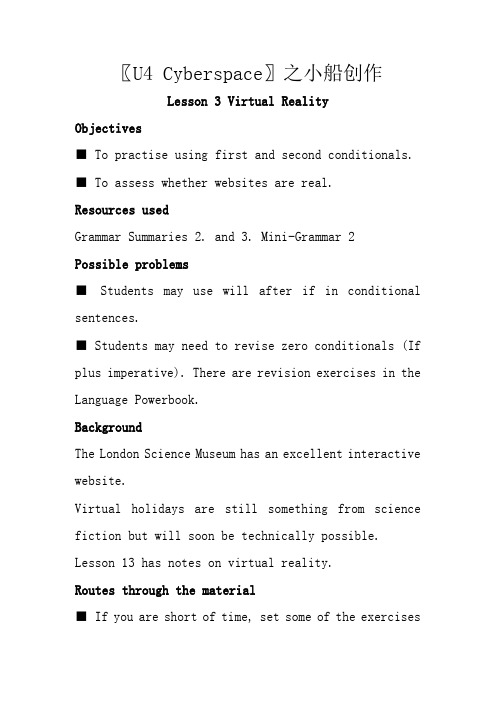
〖U4 Cyberspace〗之小船创作Lesson 3 Virtual RealityObjectives■ To practise using first and second conditionals. ■ To assess whether websites are real.Resources usedGrammar Summaries 2. and 3. Mini-Grammar 2Possible problems■Students may use will after if in conditional sentences.■ Students may need to revise zero conditionals (If plus imperative). There are revision exercises in the Language Powerbook.BackgroundThe London Science Museum has an excellent interactive website.Virtual holidays are still something from science fiction but will soon be technically possible. Lesson 13 has notes on virtual reality.Routes through the material■ If you are short of time, set some of the exercisesfor homework and omit Exercises 6 and 8.■ If you have time, do the Option activity.■ If you have two periods for this lesson, a suitable natural break is after Exercise 4.Language Power: pages 58?C59.Mini-Grammar: 2.Before you startExercise 1■ Ask students to look back at Lesson 1 and find the definition of virtual reality (Exercise 4, definition 2). Students then discuss which of the uses are possible at present (All except virtual holidays).Exercise 2■ Students look at the two websites and decide which is the real one (The Science Museum).■Students then discuss questions 1?C3 in groups before reporting back to the class. When reporting back to the class, students should give reasons for question 3, e.g. Why did you like to go to a virtual reality University? Because I can study in a world-famous university.Exercise 3■ Students read the questions, then read the dialogue to find the answers.Answers1 She has to finish her project.2 He’ll go camping if the weather is good.3 no4 no5 He would like to go to a world-famous university.6 She thought she would be able to go anywhere she liked. ■Remind students that the important words in a sentence are stressed. Then have them read the dialogue aloud in pairs, stressing the important words in each sentence.Voice your opinionExercise 4■Students talk about the advantages and disadvantages of a virtual university. The text doesn’t provide enough information, so ask students to use their imagination. You may divide the class into groups and draw two columns on the blackboard. Encourage eachgroup to add their ideas on board.GrammarFIRST CONDITIONALExercise 5You may wish to remind students of the zero conditional (see Language Power for exercises on page 57) before practising the first and second conditionals.Note that other terms may be used for conditional clauses in some grammar reference books, e.g. real/open conditions (1st conditional) and unreal/hypothetical conditions (2nd and 3rd conditionals).■Students read the sentences in italics in the dialogue and decide which situations are being talked about (b).■ Refer students to Grammar Summary 2.■ Students look back at the conditional sentences in the dialogue and read them aloud. Write the beginnings of some of the sentences on the board and add more prompts, e.g.If I don’t finish my homework, …If the weather’s good , …If it rains, …If you/I go to …,If I pass the examination, …■ Students then complete the conditional sentences talking about themselves. Exercise 6■Check answers by asking students to read the sentences aloud.Answers2 Will you go out with me on Saturday night if you finish the project?3 If you go to that website, you 'll find some interesting information.4 Will you go to that concert if it rains?5 She'll buy a computer if she gets that job.6 I’ll give you the information if you telephone me tomorrow.7 What will you do if the weather isn't good tomorrow?8 My sister won't go to London if she doesn't pass her exams.■ Ask students to look at the sentences again and note where the comma comes (after the if clause).SECOND CONDITIONALExercise 7■ Students read the sentences and discuss what the people are expressing.AnswerscRefer students to Grammar Summary 2.■ Write prompts on the board for students to complete: If w e had a holiday from school tomorrow/next week, … If I had a lot of money, …If I lived in England, …If I had a holiday in the USA, …Exercise 8■ Students work in pairs reading the sentences and deciding who could say them.■ When checking answers, ask students if they can suggest what the other person would say.Answers1 a2 b3 b■ Point out to students that we can say if I were … or if I was … ,Ask students to make sentences usingif I were/was a mil-lionaire,…Exercise 9■ When checking st udents' answers, also check the use of the comma.Answers1 If I surfed the Internet, I would find interesting information.2 If I did not have a try, you would laugh at me.3 If I took part in the game, I would win.4 If you told the police, they would help you get out of the trouble.5 I would make new friends if I used the Internet. ■ Ask students to make more sentences using I would make more friends if…Exercise 10■ Elicit suggestions for places students would like to visit and ask them for their reasons. Find out which are the most popular places.■ Students then look at the places listed in the exercise and suggest things to do and see in each of them.■ Students work individually writing a conditional sentence for each of the places listed and for another three places of their own choice.■ Students work in groups, reading out their sentences.Exercise 11■ Elicit other topics to add to the list for the future, e.g. money, holidays, hobbies, friends.■ This exercise can be given for homew ork, if you wish, so that students have sufficient time to think about their future.■ Encourage students to check their own writing and, if appropriate, have small groups of students read through their texts and check them.■ Students work in pairs, dis cussing their ideal future.■ The pairs can then work in groups of four, talking about the future.OptionsPracticeDevelop Exercises 11 and have individual students giveshort talks to the class about their ideal future.。

